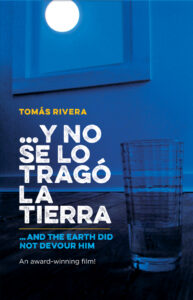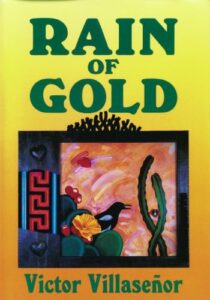Arte Público has published updated versions of two classic books in Latino literature! Tomás Rivera’s award-winning novel … y no se lo tragó la tierra / … And the Earth Did Not Devour Him was re-issued September 30, 2015, in a new edition with an updated cover and improved English translation. And, 23 years after the original publication in a hardcover version, Arte Público has released Victor Villaseñor’s acclaimed family memoir, Rain of Gold, in a new paperback format March 31, 2015.
“I tell you, God could care less about the poor. Tell me, why must we live here like this? What have we done to deserve this? You’re so good and yet you suffer so much,” a young boy tells his mother in Tomás Rivera’s classic novel about the migrant worker experience. Outside the chicken coop that is their home, his father wails in pain from the unbearable cramps brought on by sunstroke after working in the hot fields. The young boy can’t understand his parents’ faith in a god that would impose such horrible suffering, poverty and injustice on innocent people.
Adapted into the award-winning film …and the earth did not swallow him and recipient of the first award for Chicano literature, the Premio Quinto Sol, in 1970, Rivera’s masterpiece recounts the experiences of a Mexican-American community through the eyes of a young boy. Forced to leave their home in search of work, the migrants are exploited by farmers, shopkeepers, even other Mexican Americans, and the boy must forge his identity in the face of exploitation, death and disease, constant moving and conflicts with school officials.
In this new edition of a powerful novel comprised of short vignettes, Rivera writes hauntingly about alienation, love and betrayal, man and nature, death and resurrection and the search for community.
A true-life saga of love, family and destiny, Rain of Gold pulses with bold vitality, sweeping from the war-ravaged Mexican mountains of Pancho Villa’s revolution to the days of Prohibition in California.
It all began when Villaseñor’s maternal grandmother sat him down in their little home in the barrio of Carlsbad, California, gave him sweet bread and told him the story of their past. Of his mother Lupe, the most beautiful girl in the whole village, who was only a child when Villa’s men came shooting into their canyon. And of his father Juan and his family, reduced to rags and starvation as they sought refuge across the border, where they believed that endless opportunity awaited.
Lupe and Juan met and fell in love in California, but they found that the doors to the Promised Land were often closed to those from south of the border. His father was forced to take the law into his own hands, in spite of his wife’s objections. With humor and warmth, Villaseñor shares this passionate love story that celebrates the triumph of the human spirit.






